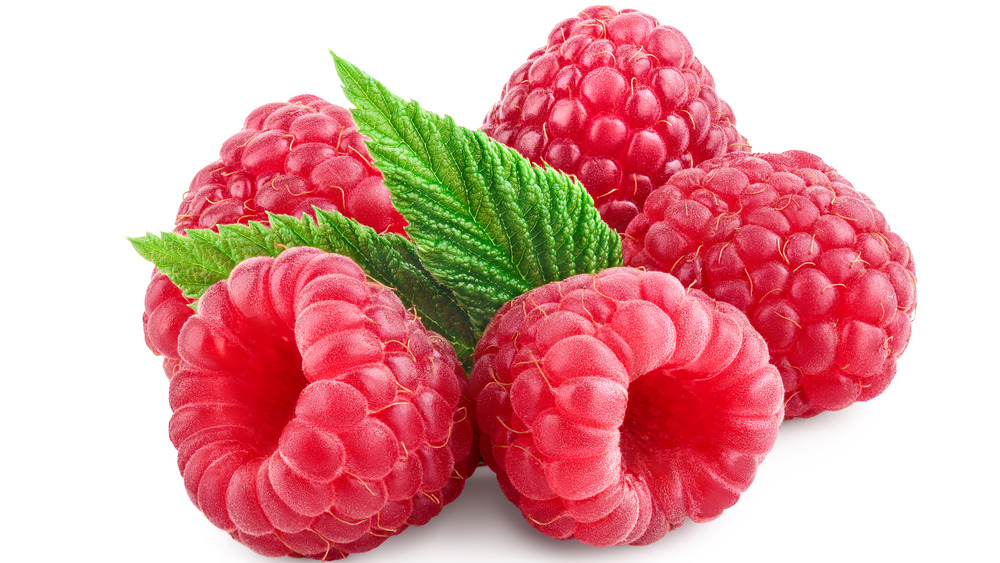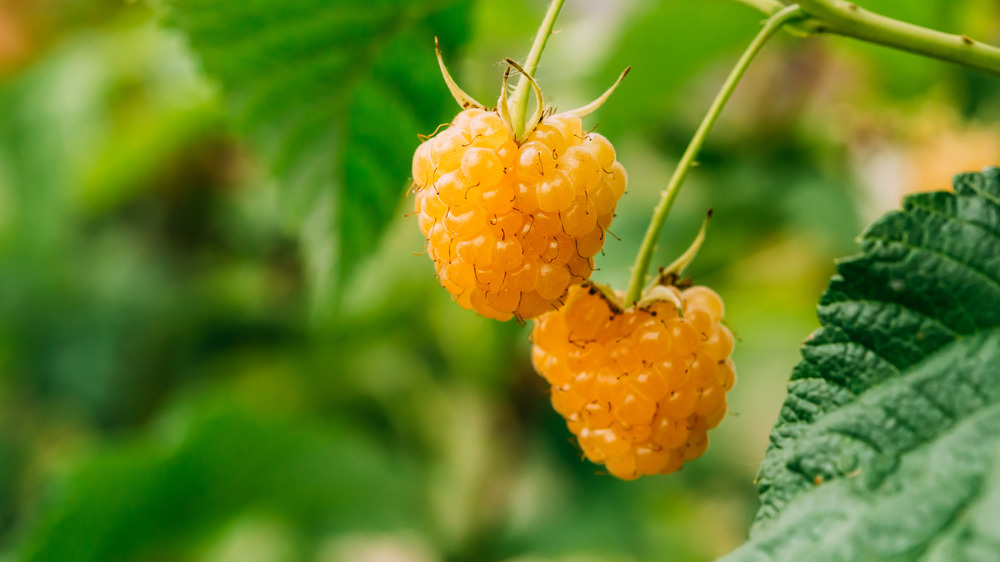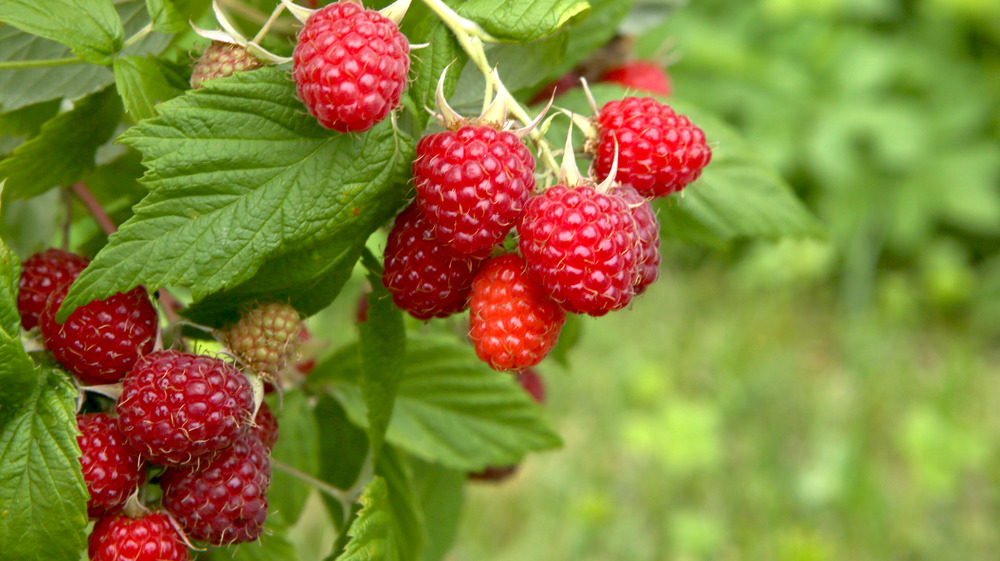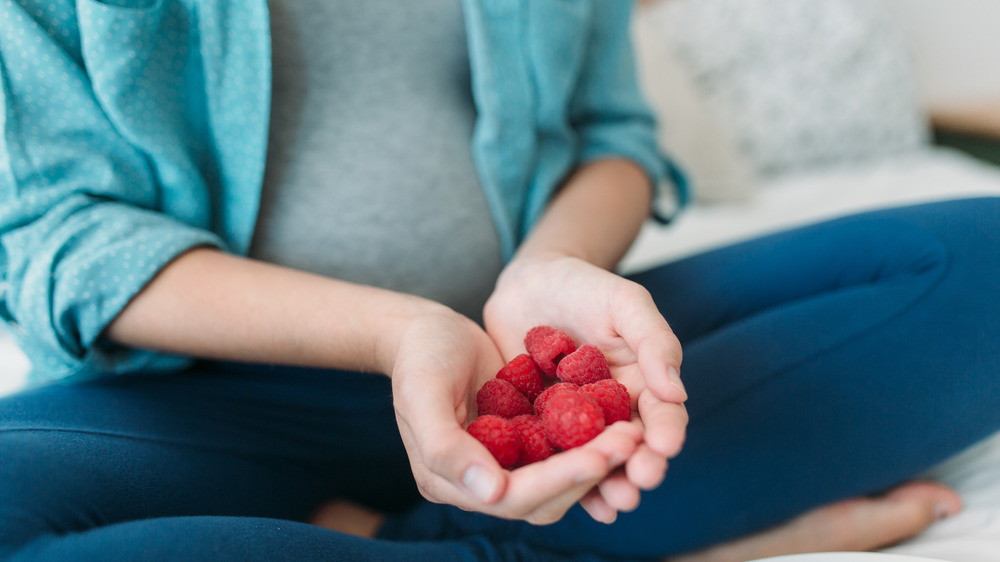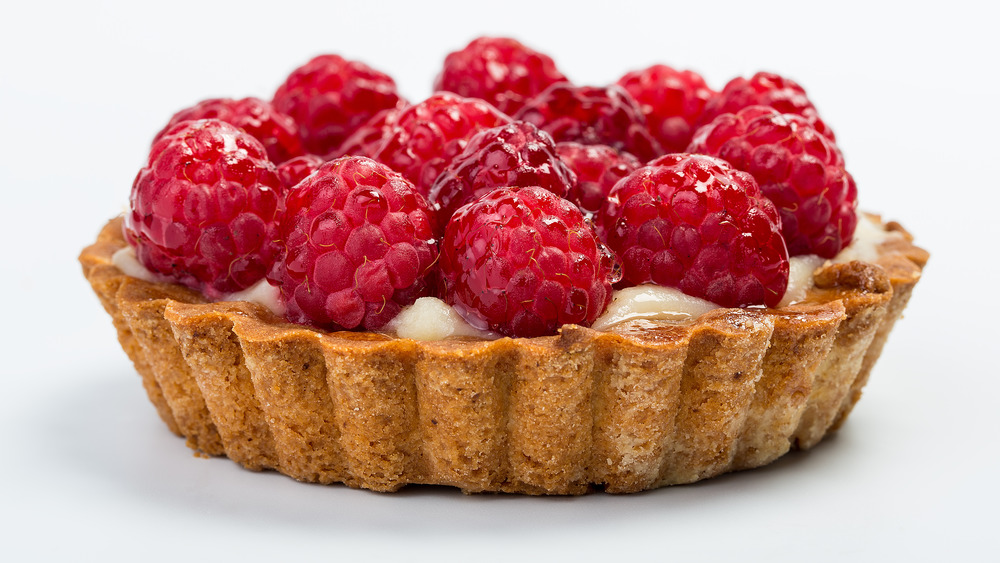What You Didn't Know About Raspberries
Raspberries are one of the best fruits out there, period. While they did not come out on top of Mashed's recent poll of favorite fruits, that's probably because they weren't included as one of the choices. Okay, so they do have a few drawbacks — they can be on the pricey side, and they also tend to spoil in next to no time in the fridge, either developing black spots or growing mushy and/or moldy. Still, that's just nature's way of giving you permission to gobble down all the raspberries as soon as you buy them.
In raspberries' favor, besides their tangy-sweet flavor, their gorgeous color, and the fact that they appear in the title of a Prince song, is the fact that they are even more nutritious than strawberries. Not only are they low in calories and full of vitamins and minerals, but they are also high in fiber, low glycemic index, and contain the powerful antioxidants known as flavonoids. Plus, if you're doing paleo, you might be interested to know that Science Nordic says there's plenty of archaeological evidence showing that large quantities of wild raspberries were consumed by our ancient ancestors.
Raspberries come in many colors (but not blue)
While the word raspberry, when used as a color, always denotes a pinkish-red, raspberries themselves come in several different shades. Berkeley Wellness lists golden raspberries, which are supposed to taste sweeter and have hints of apricot and banana; black raspberries, which taste somewhat similar to (but are totally not the same thing as) blackberries; and purple raspberries, which are a cross between the black and the red varieties.
One color that does not exist in nature, or anywhere outside of a laboratory, is blue raspberry. This flavor dates back to the 1970s when it was originally created just to provide another flavor (and some contrasting color) for the ICEE, then only available in cherry. While blue raspberry ICEES, Sour Patch Kids, and other electric blue foods and beverages don't really taste much like raspberries, the flavor is actually intended to emulate a related fruit called the white bark raspberry, which is neither white nor blue, but purple.
Raspberries in legend and lore
One legend about raspberries has to do with how they got their red color. According to Mavis Butterfield's One Hundred Dollars a Month blog, legend has it that raspberries were originally white, but a woman (or nymph) named Ida who was caring for the infant Zeus pricked her finger on the thorns while picking raspberries for her young charge. It seems that her blood caused a permanent stain that was passed down to all that fruit's descendants. This story must have been known to whoever it was that came up with the fruit's Latin name, as its genus and species are Rubaeus Idaeus. Rubaeus means red, and Idaeus translates to "of Ida," so basically the name would appear to mean "Ida's red thingies" or something to that effect. (The Practical Herbalist says that Rubaeus translates to mean bramble bush, and "Ida's bramble bush" makes sense, too.)
Raspberries have occasionally been credited with magical (or magickal) properties. The Herb Society of America blog says that in Germany, bewitched horses were supposedly cured by binding raspberry cane to their bodies, though it's to be hoped that they didn't use any of the thorny bits. In the Philippines, raspberry canes hung outside people's homes were said to be able to protect the residents from any wandering spirits who might be inclined to drop by and make pests of themselves.
Raspberries may not be great for pregnant women
In days past, raspberries were often associated with women's reproduction. One Hundred Dollars a Month says that the ancient Greeks thought the plant symbolized fertility, while the Herb Society blog said that women used to use it to prepare their wombs for childbirth and to ease delivery and breastfeeding. Kind of ironic, given that, according to Web MD, modern-day research indicates that raspberries might not be such a friend to either pregnant or lactating women.
That site says that there is very little proof that raspberries can help prevent morning sickness, shorten contractions, or ease labor pains, which is not all that surprising, since not every folk remedy is backed up with scientific fact. What is somewhat of an eyebrow-raiser, however, is the fact that they say pregnant women may need to steer clear of raspberries, or at least raspberry leaf supplements, since there is some possible risk that these might bring on premature labor. Women who are breastfeeding are also cautioned against the use of raspberry supplements, since there's insufficient evidence as to how these may affect the infants who'd be receiving them via the milk.
Raspberries' greatest hits
While raspberries are just about perfect all by their plain, naked selves, they're also an integral ingredient in some insanely delicious desserts. Raspberry sorbet is summertime in a dish, while frozen raspberries lend their flavor to the traditional Scottish cranachan that's made to celebrate a mid-January holiday. Linzer cookies, one of Ina Garten's favorite holiday treats, are traditionally made with raspberry jam (the Barefoot Contessa has a recipe on her Food Network site), and raspberries are used to flavor Chambord, a liqueur that can be swapped for crème de cassis to turn a Kir Royale into a Kir Imperial. (You may also know it from the Cheesecake Factory's boozy pink lemonade.) Perhaps the original recipe (via The Old Foodie) for the Harry Potter-approved Knickerbocker Glory is made with crushed raspberries, ice cream, and chocolate syrup, proving that raspberries + chocolate have been a perfect match for over 100 years. And then there's raspberry pie (the dessert, not the no-frills computer)... Whenever you spot this exquisite-yet-elusive beast on a restaurant menu, order it quick before it disappears!
Still, the best recipe for raspberries is as follows: wait for a perfect June day, then visit a pick-your-own raspberry farm. Pick a few extra quarts (raspberries freeze well), then stop at the farm stand to buy a few jars of raspberry jam, as well.
